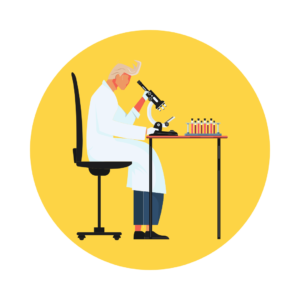These days there are a number of ways that patients, carers and even the public in general can get involved in decisions about healthcare and research. In particular, many researchers cannot get funding for projects unless they have consulted with the patient population with the disease they are studying. Organisations such as the National Institute for Health & Care Excellence (NICE) in England and the Scottish Medicines Consortium in Scotland (SMC) also assess and make decisions about new drugs and medical technologies, with patients and carers included in these discussions.
From 2020, AMEND began to see a large increase in enquiries for our community to help advise research projects, and participate in technology assessments with NICE and the SMC. It is no longer possible for our small staff to represent our increasing number of different disease communities in this way.
This is why we have developed Community Advisory Groups.
What are Community Advisory Groups?
The aim of our Community Advisory Groups (CAGs) is to better and more directly represent our patient communities by:
- advising AMEND on its work, projects or unmet needs
- advising researchers on the patient perspective
- provide evidence for and participate in technology assessments (e.g. NICE, SMC)
For example: our current CAG for medullary thyroid cancer is advising on a potential new clinical trial with periodic meetings whether they feed back to the researcher with any comments or concerns they have about the research funding proposal contents. Other members have been involved in providing evidence to NICE and the SMC technology assessments of the promising therapy, selpercatinib.
-
What Diseases are Covered?
In order to provide better representation, we have organised a group for each of diseases we cover and are currently recruiting patients or carers to the groups marked with asterisks*:
- Multiple Endocrine Neoplasia type 1 (MEN1)
- Multiple Endocrine Neoplasia type 2 (MEN2 or MEN2A)*
- Multiple Endocrine Neoplasia type 3 (MEN3 or MEN2B)*
- Phaeochromocytoma and Paraganglioma Syndromes (PPGL)*
- Adrenocortical Cancer (ACC)
- Medullary Thyroid Cancer (Sporadic and Genetic MTC)
-

Who can Apply?
We are looking for people who are:
- members of AMEND (including ACC Support UK or Phaeo Para Support UK)
- Enthusiastic about patient participation in research and research into their disease
- Confident talking about their disease in public
- Knowledgeable (or willing to learn) about medical research and health technology assessment processes (training can be arranged)
- Have the ability to participate in meetings on week days and/or evenings.
How do I Apply?
If you are interested in volunteering to join one of our CAGs, we ask you to provide us with a few details. Your application will be reviewed and an interview may be required. To get started, please complete the following form (then click ‘subscribe’ at the top of the form):
IMSR Public Engagement Event, June 2021
We are grateful for the invitation from the University of Birmingham’s Institute of Metabolism & Systems Research (IMSR) to speak at their 2021 public engagement event on Power of the Patient Voice. This was a free event and you can view this, including a talk by AMEND CEO, Jo Grey, below.
-
Patient Participation in Endocrine Research